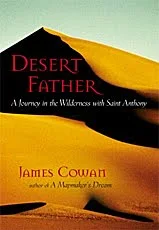
In preparation for next Sunday's Adult Christian Education Class concerning desert spirituality (9:15 a.m. at St. Paul's, Chattanooga--come one, come all!), I stumbled upon James Cowan's book,
Desert Father: A Journey in the Wilderness with Saint Anthony (Boston: Shambhala, 2004). I was initially struck by the fact that something contemporary had been written on St. Anthony the Great. Since Anthony is the patron of my Order, I was sold in wading through the book, and I'm about half-way finished.
Those familiar with Abba Anthony, as he's sometimes called, know him through St. Athanasius' biography of Anthony--of which there are numerous editions chronicling Anthony's retreat to the desert and his teachings. Cowan's work is interesting because he is using his own spiritual journey alongside that of Anthony. Cowan leaves his academic career in Australia in order to pursue Anthony into the wilds of Egypt, whereupon he lands in one of the oldest monasteries in Christendom, the Coptic monastery of Saint Anthony. Here at the monastery, Cowan encounters a strange new friend, a person the monks there consider to be the last solitary in the Church, a man named Lazarus who himself is an Aussie ex-pat who renounced the world. Lazarus lives in a cave high atop Mount Colzim, the mountain where Anthony lived. The monastery sits just below the mountain.
Here's an excerpt:
These were the questions that I brought to Lazarus's attention on my occasional climb up the mountain. I did not make such trips often, believing that it was important to contemplate questions myself before inflicting them on my friend. I was conscious of not imposing myself on Lazarus in a way that might interfere with his life. He had a right to his solitude, as he had fought hard to acquire it. As a practicing hesychast, Lazarus deserved more than to have his world examined by someone like me.
Cowan paints vividly the Roman world in which Anthony and the desert fathers and mothers fled the cities in silent rebellion. The desert, the great metaphor for the human soul, is the background in which Anthony overcomes the temptations of the adversary. Again, Cowan writes:
In my desire to deepen my knowledge of Anthony and the Desert Fathers, I had wandered into a cenobium of spiritual masters. These men weren't recluses who chose the desert simply to escape Roman oppression. They were men in possession of a vision unique to the world. The fact that the desert was the place where they developed their knowledge was incidental. What they had been looking for was a metaphor to enter and inhabit. Here at the foot of Mount Colzim lay that metaphor: every stone and cave in the mountainside was testament to the life of men who had come here to test themselves in, and against, the desert. Most of their names were anonymous, their their silence was like a chorus. I could hear them uttering the eulogy of the solitary: 'We are the katachoi, the withdrawn, the God-possessed.' It was a eulogy of promise.
So rather than reading some dry, arid history of a desert saint, Cowan manages to bring to life Anthony's legacy through the text. In fact, I have learned quite a lot about Abba Anthony through Cowan, things that I missed in Athanasius' account.
Contemporary and compelling, Cowan has given us an oasis beckoning us to see where the living springs of God burst forth from the desert life.




